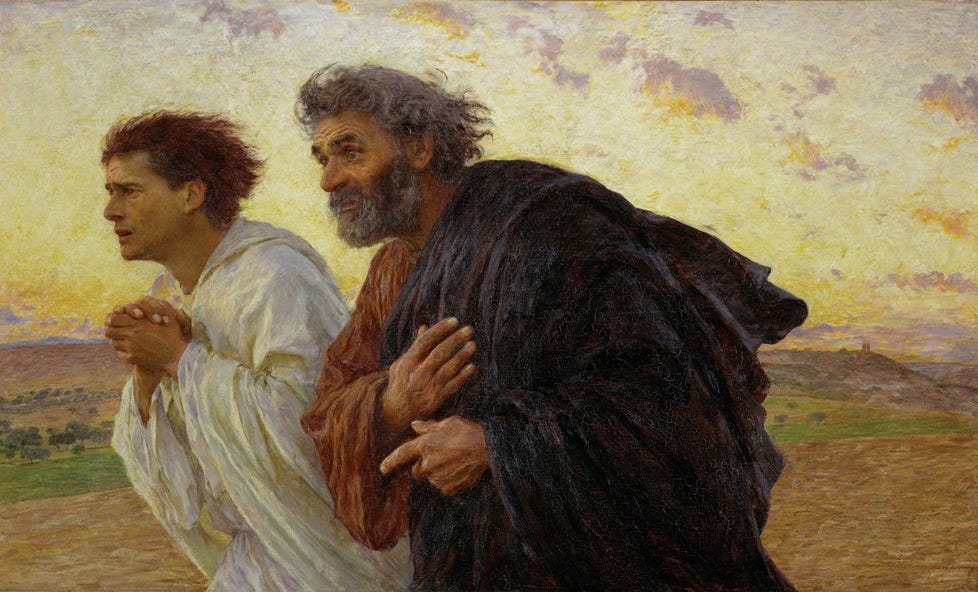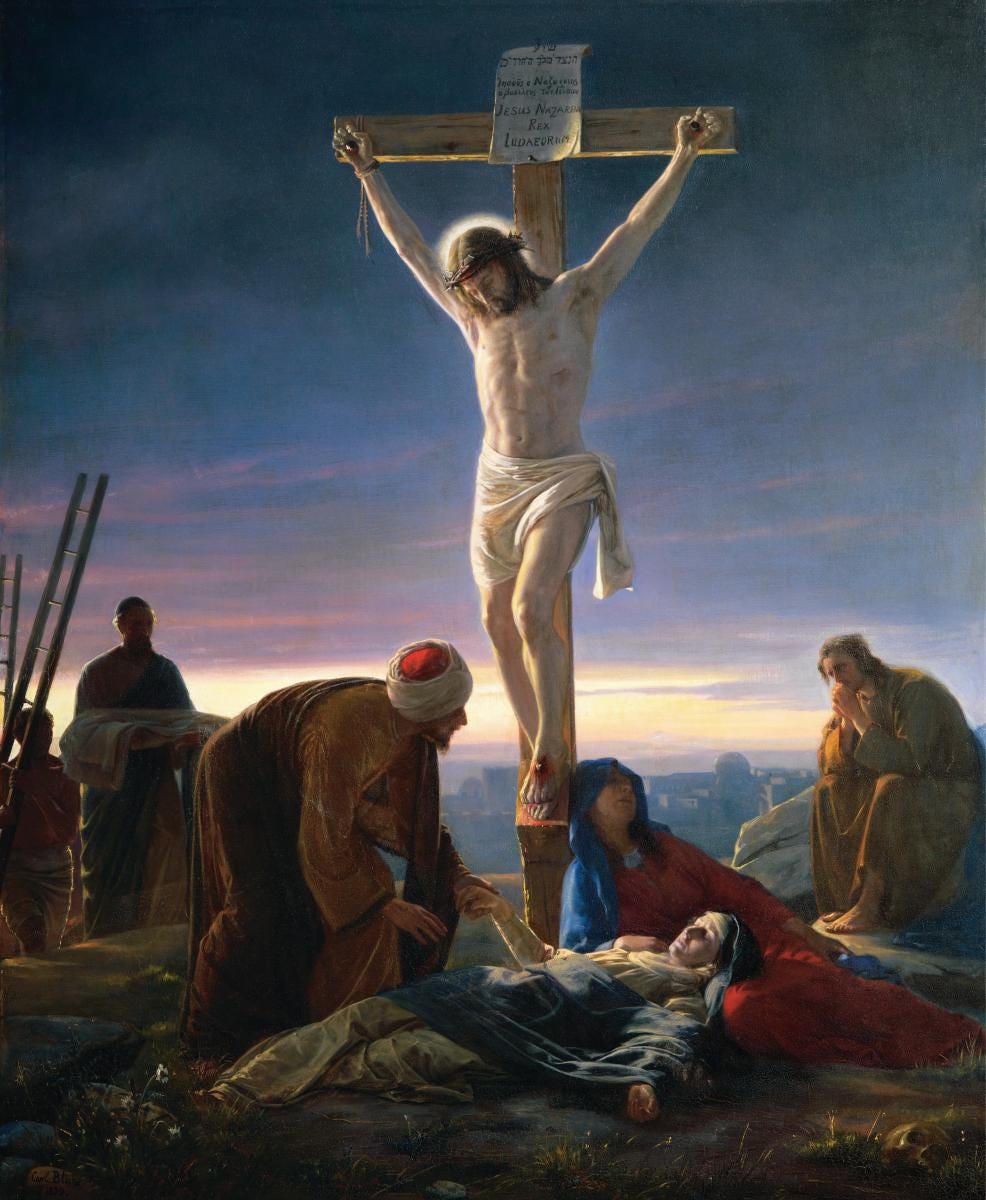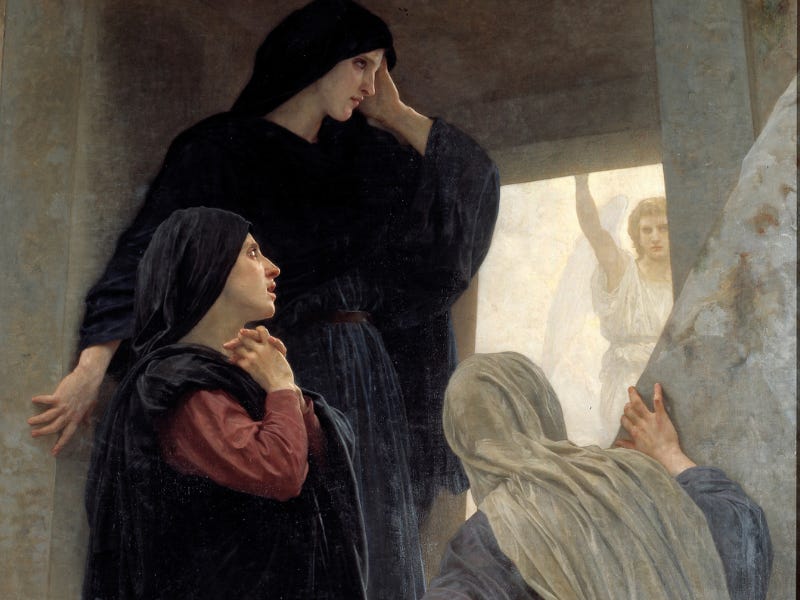Bitter cups and broken hearts
Between when a terrible thing has happened and the miracle hasn't.

This is about between.
Between when a terrible thing has happened and the miracle hasn't.
It’s about the darkest part of the longest night, before the first hint of sunrise.
It's the moment we're all in right now.
Easter is wonderful and terrible and light and dark (so very dark) and if it doesn't both break and hallow your heart you just might be doing it wrong.
None of us were there at the cross. Reading today what happened so long ago is good and important but also so inadequate to fully feel and understand what His disciples and friends must have felt. He was their friend. Their Master. They'd given up everything to follow Him. They'd watched Him perform miracle after miracle, including several when He raised someone from the dead. What was death to Him?
I personally can't begin to imagine how it would have felt to watch in helpless heartbreak as He was nailed to a cross, naked, His mortal body bruised and broken. Or to hear the vulgar taunts, to hear His forsaken soul cry ("Eli, Eli, why has thou forsaken me?”) and then, perhaps hardest of all, to see His lifeless body pierced with a spear, confirming He was really gone.
Resurrection meant nothing. No one had ever returned from the grave. When someone you loved died they were gone forever. Yes, He had said He would rise from the dead. But when He said it, did they believe... or did they shrink in unuttered terror, imagining Him returning with His body horribly disfigured, in the same condition it was in when He was entombed? The record is silent.
I step back in wordless wonder as I think about the moment when they removed His lifeless body from the cross. How must they have felt to see His hands, which had blessed so many (including those whose loving hands would soon prepare His body for burial) now pierced and swollen? How agonizing it must have been to behold the wound in His side, to look upon His well-worn feet which had led Him so many times to those in dire need, now savagely “wounded in the house of His friends?”
All of this is a poor attempt at expressing “the smallest part which I feel” about the meaning, for me, of Easter. To fully feel the miracle of the empty tomb, early on that “first day of the week,” there must first have been His one-way walk from the upper room to Gethsemane. And for His disciples who “believed not for joy” as He stood before them, with a tender invitation to “handle me, and see,” the hope-shattering space between the end of His life and Resurrection was also required.
Each one of us, in this life, are going to face deep pain, and deep sorrow, and deep anguish, fear and dread. And to know that our Savior, himself, faced that and felt that on levels unimaginable—this is part of what makes him a God not of just sympathy, but empathy.
Dr. Anthony R. Sweat
For the lonely, He walks with them.
To the suffering, He encircles them in the arms of His love.
To those who have lost a beloved one, He is “the resurrection and the life.”
To those feeling forsaken and forgotten, He has “engraved them upon the palms of his hands.”
In the poignant poetry shared by Elder Jeffrey R. Holland (oh please, Father, spare his life a little longer) in speaking of that moment when Jesus felt forsaken by the One He loved and missed the most, we begin to understand that in considering the meaning of “between” is to know the true miracle of Easter:
Nevertheless, that the supreme sacrifice of His Son might be as complete as it was voluntary and solitary, the Father briefly withdrew from Jesus the comfort of His Spirit, the support of His personal presence. It was required, indeed it was central to the significance of the Atonement, that this perfect Son who had never spoken ill nor done wrong nor touched an unclean thing had to know how the rest of humankind—us, all of us—would feel when we did commit such sins. For His Atonement to be infinite and eternal, He had to feel what it was like to die not only physically but spiritually, to sense what it was like to have the divine Spirit withdraw, leaving one feeling totally, abjectly, hopelessly alone.
Even the Savior needed to experience between, that He would know “according to the flesh how to succor his people according to their infirmities” (Alma 7:12.)
Crucifixion before resurrection.
Gethsemane and Golgotha before the garden tomb.
Good Friday before Easter Sunday.
Between is where we grow.
It's where empathy happens.
Where character develops.
Where we learn to say and mean "thy will be done" no matter what.
Between is for bitter cups and broken hearts, yes, but also for faith in "things which are hoped for...and not [yet] seen." (Ether 12:6)
On this Easter Sunday, I give thanks for my own "betweens." I rejoice in the promise of the empty tomb while also acknowledging the necessary but agonizing hours before the stone was rolled away.
Jesus, once of humble birth,
Now in glory comes to earth.
Once he suffered grief and pain;
Now he comes on earth to reign.
Now he comes on earth to reign.Once a meek and lowly Lamb,
Now the Lord, the great I Am.
Once upon the cross he bowed;
Now his chariot is the cloud.
Now his chariot is the cloud.Once he groaned in blood and tears;
Now in glory he appears.
Once rejected by his own,
Now their King he shall be known.
Now their King he shall be known.Once forsaken, left alone,
Now exalted to a throne.
Once all things he meekly bore,
But he now will bear no more.
But he now will bear no more.
Happy, hopeful Easter, friends.






You were able to pen my feelings exactly. Well said!
Made my heart weep. Wonderful expressions Scott. Love you. Happy Easter. Mom